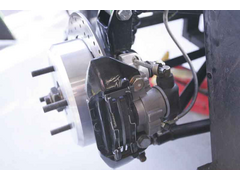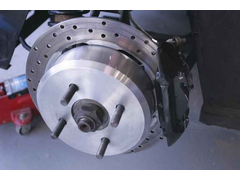However i would be wary about front use unless the car is very light i.e 300kg.
I reckon 8mm fronts would do the job, and its on my to do list.
Al.


Description


Description
[Edited on 1/3/09 by Wadders]

I'm looking at fitting brake discs with seperate alloy bells and am a bit agast at the price.
One route suggested on this forum is to use motorcycle discs.
Has anyone tried it out? I'm a bit unsure over the thinness of the ones I've looked at (4mm to 5mm) compared to car ones at 10mm. Do they
warp?
Also they seem blooming pricey to me, £60 for a flat disc? I can buy the pucca AP ones for £80!!! Perhaps I'm looking in the wrong place.
Cheers
i havnt tried it yet but its on my to-do list.
i was thinking about making up spacers to go between caliper halves so it would fit over a 10mm disc.
either that or maching new hubs to accept a m-cycle disc.
edit: didnt read your post right, in thinking of using m-cycle calipers aswell.
[Edited on 1/3/09 by dinosaurjuice]
Have used CBR 600 discs on the rear, no problems to report whatsoever.
However i would be wary about front use unless the car is very light i.e 300kg.
I reckon 8mm fronts would do the job, and its on my to do list.
Al.


Description


Description
[Edited on 1/3/09 by Wadders]
Excellent Al as I'm only sprinting and hillclimbing the car I'll take the risk on the front.
Why did you source the CBR600 discs?
Yes dinosaurjuice I thought of using the bike calipers but decided in the end to go for F3 spec ones just because they are so slim a 280mm disc can
fit in a 13" wheel
Cheers
David
has anyone thought about fitting the disk to the wheels ???
Er why?
How would you get the wheel off without disconnecting the caliper?
Ah! do you mean turning the disc inside out and bolting it ti the periphery of the wheel with the caliper towards the center - neat. Means the caliper
could be stiff (hence bulky) but still allow maximum disc diameter.
Quick patent it
My effort, as discussed
HERE
Discs are from the rear wheels of early 80's Kawasaki's, about 9 mm thick
Cheers
Fred W B
r disc
[Edited on 1/3/09 by Fred W B]
[Edited on 1/3/09 by Fred W B]
Fred,
Thats the post I remembered ta. What outside diameter are the discs? How did you fitthem to the bells? I've read conflicting advice that they
should/should not be bolted with a sliding fit to allow for expansion?
cheers
Got the discs from Rufforth autojumble, £20 for the pair.
Al.
Why did you source the CBR600 discs?
Yes dinosaurjuice I thought of using the bike calipers but decided in the end to go for F3 spec ones just because they are so slim a 280mm disc can
fit in a 13" wheel
Cheers
David
quote:
What outside diameter are the discs?
quote:
How did you fitthem to the bells?
quote:
I've read conflicting advice that they should/should not be bolted with a sliding fit to allow for expansion?
How do you go about arranging a handbrake on a bike rear setup?
quote:
How do you go about arranging a handbrake on a bike rear setup?
Fred,
Only one piece disc brakes are bolted solid when an aluminium bell is used with a steel or cast iron disc there are sliding joints to allow for
differential expansion.
Some bikes use a spider for the center part which flexes. For light use some say if the bell is deep enough it will flex enough to allow the expansion
without "coning" the disc.
For a flat disc however the manufacturers litrature I have read is unanimous that there should be some sort of expansion provisions.
Some bikes appear to have a sort of hollow rivet and I hav'nt a clue how this works but I'm sure it would be worth pursuing.
Hence my interest to see if there had been any problems in practice.
Cheers
David
[Edited on 3-3-09 by v8kid]
quote:
Originally posted by v8kid
Some bikes appear to have a sort of hollow rivet and I hav'nt a clue how this works but I'm sure it would be worth pursuing.
Ah! The mist clears.
I did not realise bikes could only brake at 1g but on reflection with their short wheelbase and high CofG it all makes sense now.
Many thanks.
I have seen a lot of bike brakes used on cars but never any over 400kg and never on anything used on the road.
Basically nearly all of them are autograss cars, which really don't need brakes other than to pass scrutineering!!
I have seen them on a few hillclimb cars but these were sub 300kg
Thanks NS that confirms it in my mind. I'll go for car based floating discs but it was worth asking and I learnt a bit about bikes anyhow!
Cheers
David